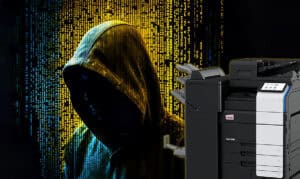Copybox Document Systems has a reputation of ensuring its products and practices are effectively helping the environment. Technical Director, Paul Kamlesh said, “For us, it’s a priority to maintain sustainable practices, within our customers, our community and our own business, to help reduce our impact on the global ecosystem”.
Copybox only supply products that have been designed and manufactured with the environment in mind which is one of the reasons why they choose to supply the range of Develop business multi-functional printer-copier-scanners (MFPs) and Brother desktop printers.
Printers and MFPs are often viewed as being less caring and more damaging to the environment but, in fact, the opposite is true. Production processes, built-in energy saving functions and the way they operate actually reduce the impact they make.
Working with caring manufacturers
What is more, manufacturers such as Develop, are driven by their eco policies, with all system components being recyclable, the implementation of a “zero waste” principles at manufacturing sites and a carbon neutral policy towards printing.
For a start, the Develop products, supplied by Copybox, have to meet incredibly stringent criteria and compliance standards, set by international standards bodies. These include Energy Star and the European Blue Angel mark. The range is ISO 14001 certificated for their fast and efficient handling of environmental issues at every stage of the product life cycle – from the selection of raw materials and components through development, production, distribution to service and disposal.
What is more, manufacturers like Develop are driven by their eco policies, with all system components being recyclable, the implementation of a “zero waste” principle at manufacturing sites and a carbon neutral policy towards printing.
Let’s talk specifics
Copybox’s MFPs feature duplex printing as standard and polymerised toner, which is cleaner than standard toner and fuses to the paper at very low temperatures. In fact, all Copybox models operate to reduce carbon emissions by operating with low power consumption. A typical full colour MFP operates at less than 1.58 kW. In saving power there are significant cost-savings to customers who use the machines.
There are several modes that these products use, such as “toner save” and “energy save” settings. The MFPs are designed with a proximity sensor that ensure a machine is only re-activated from ‘stand-by’ mode when a user’s finger is close to the operator panel and can be set up to only enable the printer, scanner or copier to function, as required, when powered up from “sleep mode”, meaning the entire machine does not have to power-up unnecessarily.
The printers and MFPs are now much quieter when operating, than in previous years. There are fewer moving parts and in-built fan-based technology reduces the sound and heat produced by this equipment, as well as avoiding paper jams. Within the range of Copybox’ MFPs, air is passed across the paper allowing it to remain separated, from other sheets, as they are drawn into the paper path and can flow straight and smoothly through the machine.
MFPs also feature measures to reduce paper wastage. Prints can be previewed at the operator panel, prior to being printed, to reduce errors and the unnecessary discarding of paper. Meanwhile, the automatic deletion of blank pages during copying and scanning processes, reduces paper usage even further.
With fewer working parts, and longer lifetimes on consumables, reliability is greatly increased and the need for maintenance callouts is reduced, along with the overall total cost of ownership because there is less waste, and less energy consumed.
From the products’ manufacture to their end of life, recycling used to be one of the biggest challenges in the industry but now it plays a major part. Not only are the products made up of fewer parts, but the printers and their consumables are manufactured with high quantities of recycled and recyclable materials too.
This means that there are levels of upcycling already ingrained within each machine and most of the parts can be re-used for re-manufacturing when the products are too old to function or are superseded which all contributes to the world-wide circular economy.
There are already steps being taken to ensure that as many old printers and consumables as possible find their way back into circulation and are not discarded.
How does Copybox Document Systems get involved?
At Copybox, the team personally get involved in collecting used parts and consumables from their customers. The items are collected in specially designed cartons and taken away for recycling or disposal under the current WEEE Directives for the collection and recycling of old photocopiers and printers, their parts and consumables.
Copybox feel it’s important to give something back not just to the community but to nature which is why the company is part of the Marston Vale Forest Programme. This programme’s goal is to replant millions of trees, in Marston Forest, which were felled to make way for the old brickworks at Stewartby back in the 1960s. For every printer / MFP Copybox installs the team plants their own tree sapling within the forest.
It’s fair to say that as lengths are being made to increase care for the environment, it is also true that the products themselves are becoming better for business – in terms of reduced waste, greater productivity, increased reliability and a healthier working environment. Everyone wins – especially the planet.
PDF of our Environment Brochure
About Copybox Document Systems
Based in Bedford, Copybox Document Systems is built on years of experience within the printer and photocopier industry.
The majority of our customers have been recommended to us and we’re proud of our excellent reputation for delivering an unparalleled service to our customers and going the extra mile.
Our flexible approach to printers and multi-functional photocopiers allows us to find solutions that fit perfectly into our clients’ businesses, whether they are schools, colleges, small or large businesses, throughout Bedfordshire, Northamptonshire, Buckinghamshire, and Hertfordshire. We’re here to help and advise. Contact us to find out more.


